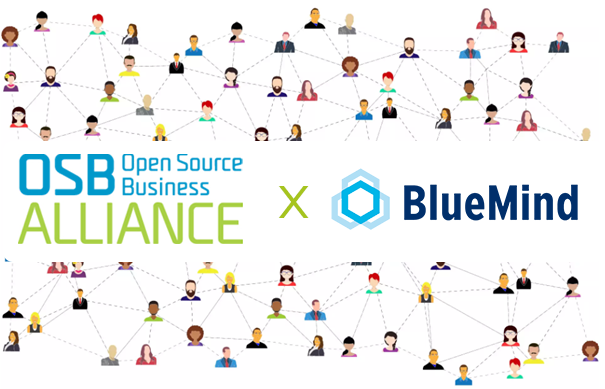
Happy new year everyone !
BlueMind wishes you all a happy holiday season and a wonderful year 2023!
Comforted by the great achievements of the past year and the unwavering trust of our customers, we stay focus without changing our course. “Being a real alternative is not about waving a national flag, it’s about offering a good product” explained Pierre Baudracco, President of BlueMind, during our last Summit. As a software company, we work every day to build this “good product”.
Today, BlueMind – continuing its constant growth – is proud to be the 1st alternative to Microsoft’s enterprise email solutions.
Quality and richness of the product, sovereignty, compatibility and respect for habits and uses, integration with the world of collaboration, trusted partnerships are the starting point for our 2023. And what a start !
New products, major functionalities, integration into the heart of the collaborative suites that have chosen BlueMind for the most part, a new emergency communication offer for cyber resilience… are part of the 2023 programme!

“Europe and digital sovereignty: loves me, loves me not…”
An article by Pierre Baudracco, BlueMind’s CEO
Digital sovereignty isn’t about blindly putting anything labelled “made in Europe” first. Contrary to popular belief, big tech companies aren’t an issue because they’re American but because they’re too powerful. They use their dominant position to impose their rules, their terms and their laws. Digital sovereignty – or independence – is about being able to choose and act without pressure or constraints.
Do as I say, not as I do
Governments and major organisations across Europe advocate digital sovereignty, but if they’re to be believed, there are no local solutions that would enable them to put it into practice. This big lie may be attributed to intellectual laziness but also – and perhaps most significantly – to intense lobbying by big tech companies with near-unlimited resources.
Saying that there are no sovereign alternatives on the Old Continent is simply untrue. The current situation is more accurately the result of short-term choices and a certain amount of indifference or acceptance IT decision makers, countries or major companies talk themselves into.
For sovereignty to be truly taken on board, we need a bona fide digital industrial strategy rather than quick fixes that prolong the status quo with a vague hint of sovereignty.
Open source: a solution, not a problem
Although software publishers are responsible for 90% of open-source software development, their role is underappreciated and all too often denied for ideological reasons, including by open source fundamentalists.
Potential clients merely view open source as a way of reducing costs while breaking free from proprietary publishers they feel trapped by. On the other hand, governments and some perhaps overly dogmatic advocates may support open source but often restrict it to their own projects. They may even anxiously insist on developing or cobbling together their own solutions, including for non-core or non-specific needs arguing that open source is all about service.
None of this works! And everyone laments that there are no credible open-source alternatives!
Unfortunately, what typically happens is that people’s legitimate aversion towards major publishers and their monopolistic or even outrageous commercial practices grows into an all-round aversion of software publishers as a whole who are viewed as business parasites.
What this all boils down to is simple. There are businesses that meet the technical, functional and ecosystem compatibility requirements needed to develop solid, long-term and quality solutions: they’re software publishers.
A solution isn’t source code
Software solution development isn’t based on providing a series of services or support. The result is always the same! It always comes back to the same denial of software publishers’ contribution and not understanding what their role is in building software solutions. Developing new features is just the tip of the iceberg.
Being a software publisher isn’t something you improvise. It involves long-term commitments, effective business governance, sound development, quality and maintenance capabilities, having a vision, being able to anticipate, and having an entire organisation that responds to the demands and needs of clients and partners who want a solution! And a solution isn’t source code… It’s a reliable, supported, quality product people like with a reasonable, transparent cost.
Working with an open-source publisher rather than trying and circumventing them will maximise your chances to succeed, to have a better solution, to ensure software continuity and to enjoy first-class skills while saving money and promoting the open-source philosophy, which everyone will ultimately benefit from.
Whether they are a company, a non-profit organisation or a foundation, software publishers are the champions of the future of open-source solutions.
A little light at the end of this cutthroat tunnel
This lack of vision or government will must be addressed quickly, but all hope isn’t lost:
- Strong positive signs are being felt at the European level with the EU’s approval of the DMA and the DSA to try and bring some order to the digital Wild West,
- There are real European solutions that put out all the stops to offer credible, well-grounded solutions,
Software publishers are here. Solutions, including open-source ones, exist. All that’s left to do is to turn rhetoric into action and embrace them.

BlueMind joins the OSB Alliance, Germany’s Federal Non-Profit Organisation for Open Source and Digital Sovereignty
BlueMind, publisher of the first European open-source collaborative mail solution, continues to grow in Germany as it joins the Open Source Business Alliance.
French software publisher BlueMind, whose collaborative mail solution has already won over 500 clients from SMEs to government ministries, is pressing on with its mission for European technological independence by joining the Open Source Business Alliance (OSB Alliance). This federal organisation for digital sovereignty represents about 170 member companies from the open-source economy in Germany. The OSB Alliance aims to reinforce the industry’s and the administration’s trust in open-source software by working on interoperability and standards, among others.
“The OSB Alliance is the German counterpart to France’s CNLL, the National Free Software Council, which I co-chair,” explains Pierre Baudracco, CEO of BlueMind. “We advocate the same values, we fight the same fights. This is why it made sense for BlueMind to join the OSB Alliance and work on common projects.”
Incidentally, the CNLL and the OSB Alliance are co-founders of APELL, the European Open Source Software Business Association (along with CossFi, the Finnish Centre for Open Source Software, and OpenForum Europe). The APELL acts as an intermediary between national open-source organisations and EU institutions. It aims to get the voices of businesses heard, in particular in the development of European directives or public policies that have an impact on free software companies and their competitiveness.
Germany, a key market in Europe
Europe – including the Franco-German couple – is being confronted with an unprecedented wake-up call on the importance of its sovereignty, and digital sovereignty in particular. In a conflictive geopolitical context with cyber-attacks and technological supply risks at their highest, technological independence is finally recognised as a strategic issue, as the tech community has been professing all along. And the most-exposed, most critical tool we use every day that all our important documents go through — enterprise mail – is left in the hands of US solutions: Microsoft365, Exchange, Google… Why? Because when it comes to email, user habits and organisational conformism trump all.
BlueMind’s goal is to bring sovereignty and user satisfaction together by facilitating all types of accesses and uses. This has been achieved by being the only natively Outlook-compatible solution and offering the best support for Thunderbird, browser-based use and mobile access. BlueMind respects user habits while providing a wide range of features (calendars, tasks, enterprise signatures, linked attachments, videoconferencing, extensive collaborative functionalities, etc.).
BlueMind is already present in Germany
BlueMind, as always focused on its core business as software publisher, is expanding in Germany through a network of integrator partners.
Since it announced its deployment in Germany in 2021, BlueMind relies on two local strategic partners who have already rolled out its solution for several clients: Centaur GmbH and Meier Computersysteme GmbH.
About BlueMind
BlueMind is a complete enterprise email and unified communications solution. As the first European open-source software publisher, BlueMind brings organisations of all shapes and sizes the choice of a sovereign mail solution that reconciles with user habits.
Pierre Baudracco, CEO of BlueMind, has served several times as Chairman of the Paris Open Source Summit. He has been co-Chairman of the CNLL (French National Free Software Council) since 2019.
About the OSB Alliance
The OSB Alliance is a German non-profit organisation made up of public administration institutions, small and medium sized enterprises and leading open-source IT companies as well as proprietary applications and users.
A key objective of the OSB Alliance is to continuously strengthen the trust of the industry and government administrations in open-source software. To that end, it uses a wide range of instruments such as cooperation projects, networking, marketing and public relations.

